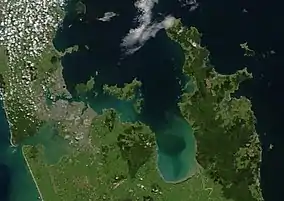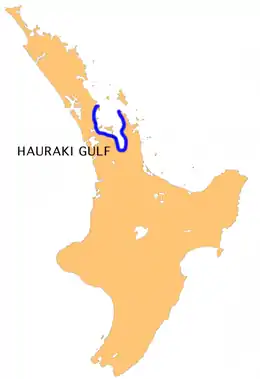Ngāti Pāoa
Ngāti Pāoa is a Māori iwi (tribe) of the Hauraki region of New Zealand. Its traditional lands stretch from the western side of the Hauraki Plains to Auckland. They also settled on Hauraki Gulf islands such as Waiheke.[1]
| Ngāti Pāoa | |
|---|---|
| Iwi (tribe) in Māoridom | |
 Hauraki Gulf | |
 | |
| Rohe (region) | Hauraki |
| Waka (canoe) | Tainui |
Ngāti Pāoa is one of five tribes of the Marutūāhu confederation, the others being Ngāti Maru, Ngāti Rongoū, Ngāti Tamaterā and Ngāti Whanaunga. The Marutūāhu tribes are all descended from Marutūāhu, a son of Hotunui, who is said to have arrived in New Zealand on the Tainui canoe. The Marutūāhu tribes are therefore part of the Tainui group of tribes. The Marutūāhu confederation is also part of the Hauraki collective of tribes.[2]
History
Early history
Ngāti Pāoa is descended from Pāoa, whose father was Hekemaru.[3] Pāoa's paternal grandparents were Pikiao from the Te Arawa tribe, and Rereiao, a high-born Waikato woman descended from Whatihua.[4] Pāoa was the brother of Mahuta, from whom Ngāti Mahuta is descended.[4] Pāoa lived with his first wife Tauhākari, sons Toapoto and Toawhana, and daughter Koura at Kaitotehe, near Taupiri in the central Waikato. Pāoa moved from Kaitotehe to Hauraki, where he married Tukutuku, a granddaughter of Tamaterā, with whom he had sons, first Haora Tipa Koinaki and second Horowhenua.
Pāoa and Tukutuku's children lived in and around the Hauraki Plains. Ngāti Pāoa later spread to the western side of the Firth of Thames, from where they also frequented the Hunua Ranges. By the 1700s they also frequented the Tāmaki (Auckland) isthmus, the North Shore and the eastern and northern Coromandel Peninsula.[5]
In about 1780 Ngāti Pāoa established settlements along the western side of the Tamaki River and at Mokoia (present-day Panmure). In 1790 and from 1793 to 1798 they engaged in many battles with tribes to the north, at least as far as the Mahurangi district. By 1805 they were tiring of war and negotiated peace settlements with many neighbouring tribes. At this time they had settlements along the Tamaki River as far as Otahuhu.[5]
Modern history
In May 2018 the tribe supported the Ngāti Whātua-o-Ōrākei tribe, in their legal case in the Supreme Court.[6]
In December 2018 the Māori Land Court ordered the Ngāti Paoa Iwi Trust and the Ngati Paoa Trust Board, who were contesting control of Ngāti Paoa affairs, into mediation over deciding who should represent the tribe in Resource Management Act and local government matters.[7]
See also
References
- Royal, Te Ahukaramū Charles (22 March 2017). "Marutūahu tribes - Ngāti Maru and Ngāti Pāoa". Te Ara – the Encyclopedia of New Zealand. Retrieved 28 July 2019.
- Royal, Te Ahukaramū Charles (22 March 2017). "Marutūahu tribes". Te Ara: The Encyclopedia of New Zealand. Retrieved 29 May 2017.
- Jones, Pei Te Hurinui; Biggs, Bruce (1995). Nga Iwi o Tainui: The Traditional History of the Tainui People/Nga Koorero Tuku Iho o Nga Tuupuna. Auckland University Press. p. 162. ISBN 1869401190.
- Kelly, Leslie G. (1940). "Taupiri pa". The Journal of the Polynesian Society. 49 (193): 148–59.
- "Deed of Settlement of Historical Claims: Ngāti Paoa and the Trustees of the Ngāti Paoa Iwi Trust and the Crown" (PDF). New Zealand Government. 18 August 2017. Retrieved 4 August 2019.
- "Ngāti Paoa support Supreme Court fight for Mana Whenua". Scoop. 24 May 2018. Retrieved 29 May 2018.
- "Ngāti Paoa dispute sent to mediation". Waatea News. 13 December 2018. Retrieved 28 July 2019.
External links
- Ngāti Paoa Iwi Trust
- Ngati Paoa Trust Board
- "Ngāti Paoa". Te Kāhui Māngai (Directory of Iwi and Māori Organisations). Te Puni Kōkiri, New Zealand Government.